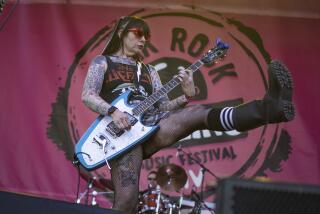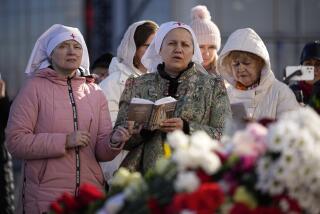Sentencing of punk rockers in Russia reignites opposition
MOSCOW — The face of dissent in Russia was once that of the outcast intellectual such as Nobel laureates Andrei Sakharov and Alexander Solzhenitsyn. Then it was the oligarch who grew rich in the post-Soviet chaos and used his wealth to challenge the Kremlin.
The torch was passed again on Friday.
A Moscow court convicted three young punk rockers, members of the provocatively named group Pussy Riot, of “premeditated hooliganism” and sentenced them to two years in prison. The crime: a February “punk prayer” at Moscow’s Christ the Savior Cathedral in which the balaclava-clad, mini-skirted rockers appealed for the downfall of President Vladimir Putin.
The court case against the young women ignited the anti-Putin cause in a way that months of protests by Russia’s weak and divided opposition movement had failed to do, and led to broad condemnation of the Kremlin by governments as well as A-list stars.
PHOTOS: Russian punk band members sentenced to 2 years in prison
Friday’s verdict followed a brief trial last week in which the rockers were accused of sacrilege and insulting the mores of Russian Orthodox believers.
Jailed since a criminal investigation of their stunt was launched in March, the trio’s plight drew the attention of a global cast of artists. Paul McCartney, Madonna, Sting, Bjork and fringe performers like Canada’s Peaches have rushed to the defense of Pussy Riot and lambasted their treatment.
Russia’s disorganized opposition politicians and rights advocates seemed infused with common purpose as they rallied outside the courthouse Friday in support of the defendants, who were little known outside Moscow’s alternative music circles before their arrests.
Nadezhda Tolokonnikova, Maria Alekhina and Yekaterina Samutsevich stood in handcuffs in a glassed-in dock of the Moscow courtroom as the verdict was read and witnesses were cited accusing them of sacrilege and satanic gestures within the cathedral.
In an apparent show of solidarity, an apartment dweller across the street from the courtroom blared one of the group’s songs loud enough to disturb the judge’s reading of the verdict. Police scrambled to cut the electricity to the apartment and silence the protest.
Relatives, friends and other spectators in the courtroom shouted, “Shame!” when the judge imposed the sentence. Outside, police detained supporters thronging the building, roughing up and arresting at least 60, independent Russian media reported, including former world chess champion Garry Kasparov.
Opposition leader Alexei Navalny, himself facing what he says are trumped-up charges of having embezzled $500,000 from a state timber operation, accused Putin of personally ordering the harsh treatment of the rockers out of “vengeance for the humiliation and fear he suffered from opposition protesters.”
Tens of thousands of Russians took to the streets late last year and early this year to protest elections for parliament and president many considered fraudulent. Putin, who served two four-year terms as president, and then became prime minister, won a new six-year presidential term in March.
Those protests appear to have fizzled, however, and through the summer Putin’s foes have faced a campaign of harassment, legal charges and tighter laws against public protests.
Amnesty International, among the first rights groups to appeal for the women’s release, called the verdict “a bitter blow” for freedom of expression in Russia. Human Rights Watch deemed the sentences “inappropriate” punishment for a political statement.
The conviction also drew expressions of concern from foreign political leaders.
“The United States is concerned about both the verdict and the disproportionate sentences handed down by a Moscow court in the case against the members of the band Pussy Riot and the negative impact on freedom of expression in Russia,” the State Department said in a statement read by spokeswoman Victoria Nuland. “We urge Russian authorities to review this case and ensure that the right to freedom of expression is upheld.”
Catherine Ashton, the European Union’s foreign policy chief, warned Moscow that by punishing the women it was violating commitments to respect individual rights and freedoms.
“This sentence is disproportionate. Together with the reports of the band members’ mistreatment during their pretrial detention and the reported irregularities of the trial, it puts a serious question mark over Russia’s respect for international obligations of fair, transparent and independent legal process,” Ashton said in a statement.
Rallies in solidarity with the rockers drew color-splashed gatherings in two dozen cities around the world. Hundreds turned out at Igor Stravinsky Square in central Paris to hail the women as martyrs to the cause of freedom. Smaller crowds, donning crayon-colored ski masks like the trio wear when performing, rallied in Kiev, Ukraine; Barcelona, Spain; Belgrade, Serbia; Berlin; London; Washington and elsewhere.
Commentaries on U.S. and European media websites cast the Pussy Riot case as a new front for post-Cold War confrontation and a test of modern Russia’s tolerance for the kind of raucous, obscenity-laden protest that often permeates punk and other alternative art expressions. Prior to the cathedral stunt, Pussy Riot rockers engaged in nudity and orgies at some events.
Though the rockers’ plight could fade from public attention over time, they represent “a potential spark out there,” said Paul Gregory, a Russian scholar at Stanford’s Hoover Institution, pointing to the power of international cultural figures in the volatile political atmosphere in Russia.
The Russian Orthodox Church, a staunch backer of Putin, called on authorities after the verdict “to display mercy on the convicted within the framework of the law,” an appeal that Russian authorities could use to defuse the situation.
But if something were to happen to one of the young rockers in prison, like a suspicious death or suicide, that could be “the kind of thing that could bring millions of people out on the streets,” Gregory said.
Other analysts viewed the crackdown on Pussy Riot as a reaction so heavy-handed as to provide a powerful spotlight for Russia’s beleaguered opposition.
“A fiction writer from the Golden Age of Russian literature could never have dreamed up a scenario as absurd and a story as far-fetched as the persecution of the punk rock band Pussy Riot,” two activists with the Human Rights Foundation, chaired by Kasparov, wrote in an article for Forbes magazine’s website.
“Those of us who attempt to keep human rights in the forefront of culture and of the public conversation can seldom find a greater gift than this perfect story,” wrote Thor Halvorssen and Pedro Pizano. “In this instance, it reveals the tyrannical nature of Vladimir Putin’s neo-czarist regime.”
PHOTOS: Russian punk band members sentenced to 2 years in prison
Loiko reported from Moscow and Williams from Los Angeles.
More to Read
Sign up for Essential California
The most important California stories and recommendations in your inbox every morning.
You may occasionally receive promotional content from the Los Angeles Times.











